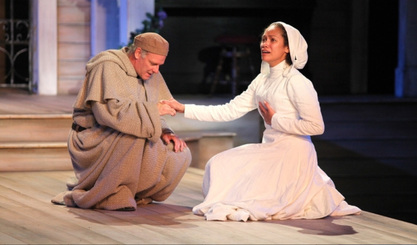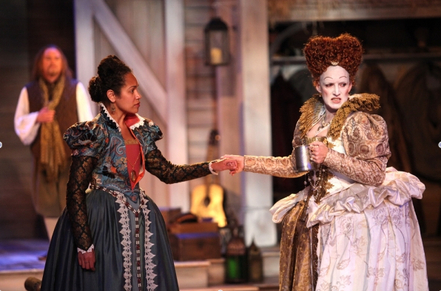Angelo goes through the town closing brothels and enforcing obscure laws, one of which results in young Claudio's (Luc Roderique) condemnation to death for impregnating his fiancée. Claudio sends for his sister Isabella (Sereana Malani), an apprentice nun, to plead for his life. Angelo falls for Isabella and utilizes his power to sway Isabella to sleep with him in exchange for her brother's freedom. The Duke devises a plot to save both Isabella and her brother and expose the error of Angelo's ways.
The story is not an easy one to follow and is a little absurd in places. Shakespeare is notorious for convoluted plots, switching identities, and wrapping up stories where more or less everyone gets what they came for. However, probably the most significantly unusual story beat that stands out is the conclusion where the Duke pairs up with Isabella. If ever there was an ending that felt like it was thrown together in a hurry, it is this. It not only comes out of nowhere, but it seems quite out of place and highly unlikely in the overall scheme of things.
The story is further complicated being set as a musical in New Orleans. It was a brave attempt by first-time Bard director John Murphy, who is otherwise one of Bard's most talented artists, but falls flat in its execution. Murphy has exceptional comedic timing but for some reason misses the mark with his rendition of Measure. New Orleans in itself, is not such a bad idea and the music and songs are pretty good: They are just poorly orchestrated. For a musical and directorial debut (many of the songs are originals), this was an unfortunate oversight.
The costumes did not help matters. They were confusing and pulled you further from the play rather than help to draw you in. The set design did not do much for setting the tone or helping the story along either. Ideally, the costumes and set design should fuse to the characters to help bring them to life however, in this case, though there were some nice moments, they were too hit and miss to keep you fully engaged.
Generally speaking, the actors who come through Bard are high in calibre and this year is no exception. The singing was not so good in this production, but was it really expected to be? Regardless of the material, the performers alway give it their all. David Marr knocked it out of the park as Pompey with unmatched comedic timing, Sereana Milani was brilliant as the pious Isabella, and Luc Roderique truly came into his own this year as young, ill-fated Claudio. Andrew Wheeler (the Duke) is always a pleasure to watch, and David Mackay played Angelo with such sinister zest it was hard not to loath him (that's a good thing). There were a few genuine treasured moments when the cast were permitted to interact with the audience, such as when Lois Anderson (Mistress Overdone) screamed her lines from the second row bleachers.
Timing is everything. If this play were sped up just a little and the songs shared rather than soloed it could be quite good. As it sits now, it drags just a little too long and a little too slowly to allow you to invest too much in the characters.
Unlike Measure for Measure, Elizabeth Rex is relatively easy to follow.
On the eve of her lover's death, as the quintessential, essential distraction, Elizabeth commands William Shakespeare and Lord Chamberlain's Men to perform Much Ado About Nothing. After the performance Elizabeth visits the troupe in the barn where they are residing as a means of occupying herself until the dreaded morning hour.
The troupe's lead female portrayer, Ned Lowenscroft (Haig Sutherland), proves a worthy opponent for Elizabeth as they battle in a war of words about love, sexuality, loyalty, and loss. Lowenscroft is dying of syphilis giving him full reign to speak the truth as he sees it. As the witching hour nears and Elizabeth teeters on the cusp of strength and frailty, Lowenscroft agrees to an exchange: He will teach her to be a woman and she will teach him to be a man.
The story starts off with light-hearted banter and quickly escalates to a dramatic richness that flows nicely and fills out the spaces around the characters. This evening as the troupe engages in a discussion about the wind and rain, the back panels of the tent, quite serendipitously, stretch inward projecting a perfectly-timed summer breeze through the audience, giving a sense of urgency and reality to the events.
Haig Sutherland gets off to a rocky start as he sets up his character, but gathers himself to show his salt as the silver-tongued Edward Lowenscroft. Bernard Cuffling shines as the bumbling Percy Gower, bringing something new and refreshing to each scene, and Lois Anderson is delightful as the near-sighted seamstress Kate Tardwell. The real kudos however, go to Colleen Wheeler (Queen Elizabeth).
Wheeler is an anomaly. She embraces this character with a conviction seldom seen and her devotion to the character is exhausting and devastating to watch (also a good thing).
Mara Gottler's costumes are gorgeous in their detail, Stacey Butterworth's wigs are definitely worth mentioning for their intricacy, and Drew Facey's set design adds depth and character to the scenes, which is critical in a play with one location. Director Rachel Ditor's blocking and direction of the secondary players is thoughtful and intuitive, allowing you to fully immerse yourself in the drama that unfolds.
Elizabeth Rex is a challenging play with room to explore: The kind of play that will grow and improve as the performers evolve.
Check out Bard on the Beach for tickets and show times.



 RSS Feed
RSS Feed
